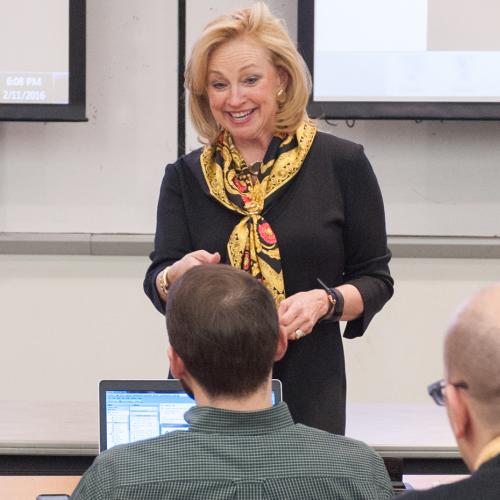Women in Tech
Persistence is the name of the game

Margaret Loper, Myrtle Turner Harris, and Barbara Fox, research scientists at Georgia Tech Research Institute and instructors at GPTE, reveal how they navigate the tech world. Photo by J.D. Tyre Photography.
March is Women’s History Month, the perfect time to celebrate women thriving in STEM fields. Three engineering and safety and health instructors from Georgia Tech Professional Education (GTPE) discuss their experiences as research scientists in the Georgia Tech Research Institute (GTRI). What led them to careers in tech? How do they navigate a male-dominated field? What advice do they have for women and girls about succeeding in tech? Margaret Loper, Myrtle Turner Harris, and Barbara Fox share their stories and insights.
Margaret L. Loper, Ph.D., is associate director of the Institute for Information Security & Privacy and chief scientist of GTRI’s Information and Communications Laboratory. Myrtle I. Turner Harris, Ph.D., is director of the Georgia Tech Enterprise Innovation Institute’s Safety, Health and Environmental Services; director of Georgia Tech's OSHA Training Institute Education Center and she is a principal research scientist and industrial hygienist. Turner Harris is course director and instructor for occupational safety and health, and related courses at GTPE. Barbara Fox, M.S., Ed.S., is a research scientist in the GTRI Information & Cyber Sciences Directorate. She also develops cybersecurity course material for professional education and conducts classroom instruction for both public and private sector organizations, including Fortune 100 companies and the DoD.
All three women have established careers in their areas of interest, conducting research as well as providing instruction to professionals and contributing their expertise to industry. But where did their stories begin? Why did they choose careers in STEM?
Choosing Science and Technology
As early as middle school, Loper excelled at math and knew that she would choose a math-related degree in college. When her chemistry teacher suggested she try a summer camp in engineering for girls at Clemson University, close to where she lived, she discovered engineering. This experience set her on her future path, and she studied electrical engineering in college.
For Fox, the realization that the tech field was for her also came early in life. An aptitude test she took during high school revealed that she’d be a good fit for a career as a systems analyst. The field fascinated her, but since the college she attended did not offer it, she studied electrical engineering.
Turner Harris chose to study biology with the intention of going to medical school. But once in college, she discovered other biology-related careers and changed course. Rather than becoming a medical doctor, she chose to pursue a career in occupational safety and health.
All three women set out on their career journeys by pursuing initial interest areas such as math, engineering, or biology. And they persevered in environments where they were vastly outnumbered by male students. In their engineering programs, for example, Loper and Fox both recall only a handful of girls and no female professors.
Loper shared that her initial college years were anything but easy. Apart from being a strong math student and learning about engineering during a summer camp, she had no technical background or experience, which would have given her an advantage at college. And with only two or three other girls in her program, finding study partners was difficult. Boys generally studied together in their dorms. Since girls weren't seen as part of the group, breaking into these teams was a challenge.
Despite the setbacks, she never gave up. According to Loper, girls who study engineering tend to think they need to be top students and are likely to drop out if they don’t excel. She believes that it’s because she didn’t place herself under this kind of pressure that she persisted and completed her undergraduate degree.
“I had no preconceived notions of the kind of student I was supposed to be,“ she said. “And that helped me stay on course even though I wasn’t necessarily the top student in class.”
Career Journeys
Fox soon realized that her interest lay in software rather than hardware, so she switched her focus to computer systems. Her career highlights include being on the ground floor of the shift from proprietary operating systems to Unix and Linux. As a systems engineer, she helped organizations understand and implement leading-edge technologies such as RISC architectures and RAID.
Loper discovered her field of interest, modeling and simulation, after her first job for an engineering firm and pursued her graduate studies in this field. She has been involved this field for more than 30 years. She created the Modeling & Simulation certificate program and teaches simulation courses for both academic and professional education.
And Turner Harris, after completing her master’s degree in public health and working for the Occupational Safety and Health Administration (OSHA) followed by another federal agency, made industrial hygiene the focus of her career. Her career highlights include developing the OSHA certificate program and the Professional Master’s in Occupational Safety and Health, which was launched in 2017.
Advantages and Challenges of Working in Tech
Building successful careers in the STEM field has meant reaping rewards as well as overcoming obstacles. The three research scientists candidly shared their views on advantages and disadvantages.
Achieving work-life balance is a challenge across fields and industries for men and women, and Loper and Fox offered their perspectives on managing family responsibilities in the tech field. “Women tend to need to do more juggling to make work and family obligations work for them than their male colleagues,” said Loper. “But at GTRI, we’re lucky since our bosses are flexible.”
Fox considers the flexibility offered by her work in tech throughout her career to be one of its most notable advantages. “Few working mothers could fix problems across the country from their home while their children napped. Today's technologies and internet across speeds open up even more time and place independence."
Both women also pointed to the range of opportunities engineering offers. Loper, for example, noted that engineering aspects feature strongly in solutions to most world problems, which shows how broad the field is and how many options it offers. Fox highlighted the ability to master different topics in technology.
"If you spend three years on one topic in tech, you are a subject matter expert,” she said. “That’s rare in other fields. How many other careers can you do that in?”
Although more women are choosing careers in STEM, it remains a male-dominated field, which poses challenges for women. Loper raised the issue of role models for women. Apart from one summer camp instructor when she was in middle school, she had no other female role models. All her professors at college were men. When she started her first job, out of 40 engineers, only two or three were women and none of them held leadership positions. She contends that this problem is prevalent in the tech field. While more women are choosing tech as a career, not many are holding leadership positions. “It’s hard when there are only a few women in leadership positions,” she said. “We have no role models. We now teach our daughters to be more aware of it but essentially, it hasn’t changed in STEM over the years.”
Turner Harris made another point about women in leadership roles. “When a woman is in a leadership position, she feels that she needs to keep proving she’s earned it,” she said. She believes that career progress for women is different than it is for men and that having support networks and people advocating for them is essential.
“We tend to have to work harder to establish ourselves. We have to be persistent. And we have to find the right people to play on our teams.”
Advice to Women and Girls Interested in Tech Careers
When it comes to considering a career in tech, Loper suggests thinking about it in terms of the world problems a potential engineering student would like to solve. Rather than choosing a field, which can be overwhelming, Loper recommends identifying what matters most to the student, what she wants to contribute to, and then identifying the engineering aspect of the solution.
“Frame the question,” she advised. “Don’t focus on the discipline but on what you’re most passionate about, and then see how engineering and math play into the solution.” She cited the example of feeding people as a world problem. Careers in fields such as agriculture and logistics focus on this problem and have engineering aspects to them such as growing food efficiently in tight spaces.
Turner Harris recommends doing homework before choosing a career field. “Do your research, be persistent, find someone to shadow, and find out as much as you can about the career field,” she advised. “You may discover industrial hygiene is not the job for you. One day you’re wearing a hard hat and boots and spending it outside on site and the next day, you’re in a clean building at your desk.”
Fox wishes she had known when starting out in her career that she didn’t need to wait until she was overqualified to apply for a job. She mentioned a Havard Business Review article that referred to an internal report from Hewlett Packard, which showed that women only applied for a promotion when they believed they had 100 percent of the qualifications while men applied if they met 60 percent of the job requirements. As a result, her advice to women in tech and to girls considering studying engineering is not to be afraid to fail.
"Fear is one of the biggest setbacks. But in the tech field, nobody knows everything. People are helpful because we’re learning all the time,” she said. “It’s okay not to be good at everything as soon as you start in tech. Just keep moving forward.”
The Changing Landscape of Tech
Women may still be outnumbered in the tech field, but Fox and Turner Harris have noticed changes in their fields. According to Fox, she’s seeing more women in cybersecurity. “It’s such a rapidly changing field,” she said. “You have to be willing to constantly read, learn, and investigate on your own to keep up with the changes.”
When it comes to occupational safety and health, Turner Harris noticed a change in the way men and women gravitate to specific careers in the field. “Women tend to focus more on industrial hygiene and occupational safety and health and men on construction safety,” she noted. “But it is shifting.” She credits the growing awareness of the field of industrial a hygiene as a career, for this shift.
Loper pointed out the value that women bring to tech because they think of different aspects of a problem. “Tech is better when women are involved. They think about different sets of users and ways of using technology,“ she explained. For example, when developing an app, men think about it in terms of how they would use it. Women may use it differently, so including their input is essential.

